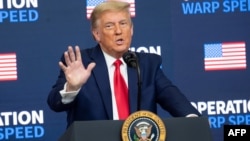African analysts and political parties are expressing alarm over the sudden U.S. announcement recognizing Morocco’s sovereignty over the disputed territory of Western Sahara.
U.S. President Donald Trump announced the decision Thursday after Morocco agreed to normalize relations with Israel. Analysts on the continent say it risks upending a delicate situation that both the African Union and the United Nations have spent decades trying to resolve.
The news landed as night fell over the African continent Thursday, and the initial reaction among political analysts and activists was one of stunned disbelief.
Those views hardened Friday as the continent’s top diplomatic body, the African Union, said nothing about Trump’s statement and its possible impact.
South Africa’s governing African National Congress party said it noted the decision “with dismay” and compared the status of the region’s residents to that of Palestinians living under Israeli rule. “The unalienable rights of the people of Western Sahara and Palestine to self-determination and freedom shall not be derailed by Trump’s ‘deal’,” is said.
The ANC statement added, “The ANC calls on all international and progressive forces on the continent and the world to condemn this deal, and to continue to work for the implementation of UN and AU resolutions.”
The Trump administration’s motivation was questioned by Sarfo Abebrese, who leads the Coalition of Supporters’ Unions of Africa, which promotes African cooperation.
“It is a very contentious issue, but one just wonders why the president of the United States should continue to wade into such matters about the sovereignty of African states, even in the dying embers of his own tenure as the president of the United States,” he told VOA.
In a proclamation, Trump said the U.S. believes that recognizing Morocco’s claim over the Western Sahara region is the “the only basis for a just and lasting solution to the dispute.” He continued, “The United States believes that an independent Sahrawi State is not a realistic option for resolving the conflict and that genuine autonomy under Moroccan sovereignty is the only feasible solution.”
He urged the parties to negotiate “using Morocco's autonomy plan as the only framework to negotiate a mutually acceptable solution.”
Morocco annexed the former Spanish colony in 1975. When the AU’s predecessor, the Organization of African Unity, admitted Western Sahara in 1984 as a member state, Morocco quit the organization. Morocco rejoined the AU only in 2017.
The AU and the U.N. have spent decades trying to reconcile the situation in the territory, where the pro-independence Polisario Front has long clamored for recognition. The U.S. is the first Western power to officially side with Morocco, in exchange for a restoration of relations between Israel and Morocco, also announced Thursday.
Of course, says Ryan Cummings, head of Signal Risk, a political and security risk management firm, it’s much more complicated than that. The coastal territory sits on top of a growing Islamist movement in Africa’s Sahel region. And the leader of the Islamic State in the Greater Sahara is a man named Abu Walid al-Sahrawi. As his name indicates, he is from the Sahrawi Arab Democratic Republic, which is the name given the region by the Polisario Front.
Could that turn this situation from contentious to dangerous? For now, Cummings doesn’t think so.
“There might be extremist groups within Morocco, within Western Sahara, that might potentially be aggrieved and look to lash out against this,” he told VOA. “But really influencing the terrorism dynamic within Morocco -- I just don't see that happening.
“Yes, it could kind of radicalize more Sahrawis to potentially join extremist movements,” he continued. “But again, these extremist movements are not directing their core focus or operational capabilities to Morocco. They're conducting the insurgencies well outside of the country and outside of the region.”
Abebrese, whose group is campaigning against what is shaping up to be an unopposed re-election of AU Commission Chairman Moussa Faki Mahamat, said he isn’t surprised by the AU’s silence.
“One would expect that the African Union Commission itself will be more proactive in delivering on its mandate on such weighty issues,” he said. “But alas, with a leader as inept and as clueless as Faki Moussa Mahamat, who is more concerned about running unopposed for a second four-year term, why wouldn’t the likes of Trump have a field day wading into our affairs in such a manner?”
Activist Daniel Mwambonu, who heads the Global Pan-Africanism Network, told VOA via WhatsApp the U.S. proclamation is “a big blow to democracy and undermines the effort that the United Nations is making to resolve the conflict.”
“I appeal to the African Union to step up so that there is no further escalation of the conflict and ensure that the United States respects the sovereignty of Africa as it determines its own issues, and also respects the decisions made by the United Nations so that the people of Western Sahara can be given the right to determine their destiny,” he said.






